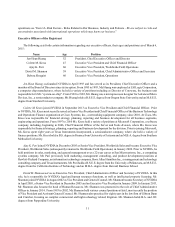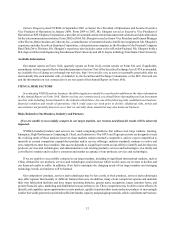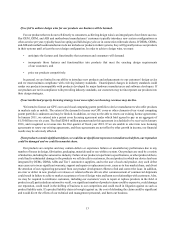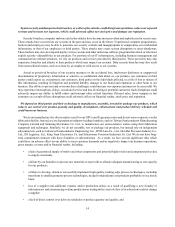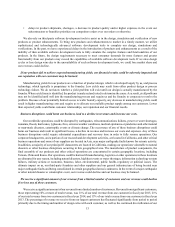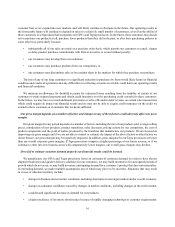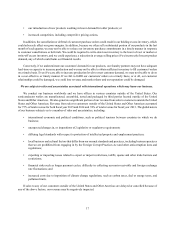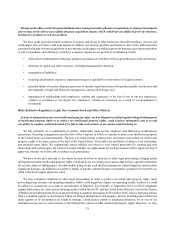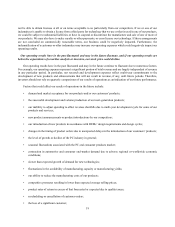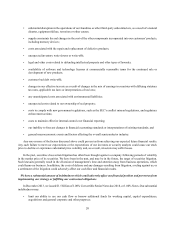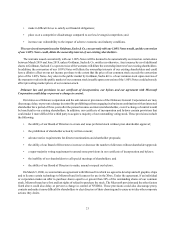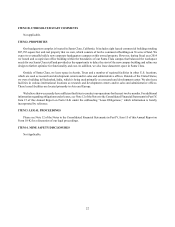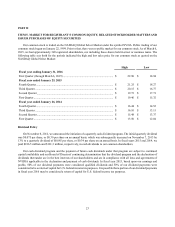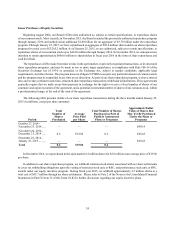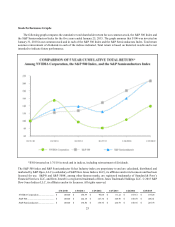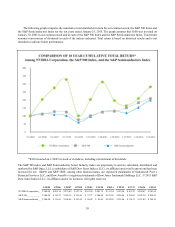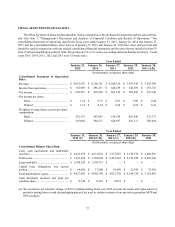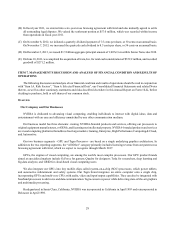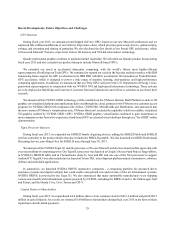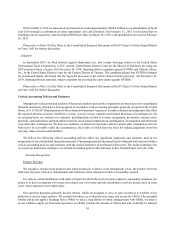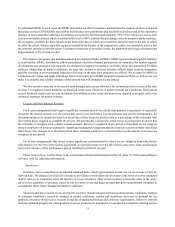NVIDIA 2015 Annual Report Download - page 101
Download and view the complete annual report
Please find page 101 of the 2015 NVIDIA annual report below. You can navigate through the pages in the report by either clicking on the pages listed below, or by using the keyword search tool below to find specific information within the annual report.21
• make it difficult for us to satisfy our financial obligations;
• place us at a competitive disadvantage compared to our less leveraged competitors; and
• increase our vulnerability to the impact of adverse economic and industry conditions.
The exercise of warrants issued to Goldman, Sachs & Co. concurrently with our 1.00% Notes would, and the conversion
of our 1.00% Notes could, dilute the ownership interest of our existing shareholders.
The warrants issued concurrently with our 1.00% Notes will be deemed to be automatically exercised on certain dates
between March 2019 and June 2019, unless Goldman, Sachs & Co. notifies us otherwise. Any issuance by us of additional
shares to Goldman, Sachs & Co. upon exercise of the warrants will dilute the ownership interest of our existing shareholders.
In addition, the conversion of our 1.00% Notes will dilute the ownership interests of our existing shareholders and could
have a dilutive effect on our net income per share to the extent that the price of our common stock exceeds the conversion
price of the 1.00% Notes. Any sales in the public market by Goldman, Sachs & Co. of our common stock upon exercise of
the warrants or sales in the public market of our common stock issuable upon conversion of the 1.00% Notes could adversely
affect prevailing market prices of our common stock.
Delaware law and provisions in our certificate of incorporation, our bylaws and our agreement with Microsoft
Corporation could delay or prevent a change in control.
Our status as a Delaware corporation and the anti-takeover provisions of the Delaware General Corporation Law may
discourage, delay, or prevent a change in control by prohibiting us from engaging in a business combination with an interested
shareholder for a period of three years after the person becomes an interested shareholder, even if a change of control would
be beneficial to our existing shareholders. In addition, our certificate of incorporation and bylaws contain provisions that
could make it more difficult for a third party to acquire a majority of our outstanding voting stock. These provisions include
the following:
• the ability of our Board of Directors to create and issue preferred stock without prior shareholder approval;
• the prohibition of shareholder action by written consent;
• advance notice requirements for director nominations and shareholder proposals;
• the ability of our Board of Directors to increase or decrease the number of directors without shareholder approval;
• a super-majority voting requirement to amend some provisions in our certificate of incorporation and bylaws;
• the inability of our shareholders to call special meetings of shareholders; and
• the ability of our Board of Directors to make, amend or repeal our bylaws.
On March 5, 2000, we entered into an agreement with Microsoft in which we agreed to develop and sell graphics chips
and to license certain technology to Microsoft and its licensees for use in the Xbox. Under the agreement, if an individual
or corporation makes an offer to purchase shares equal to or greater than 30% of the outstanding shares of our common
stock, Microsoft may have first and last rights of refusal to purchase the stock. The Microsoft provision and the other factors
listed above could also delay or prevent a change in control of NVIDIA. These provisions could also discourage proxy
contests and make it more difficult for shareholders to elect directors of their choosing and to cause us to take other corporate
actions they desire.


